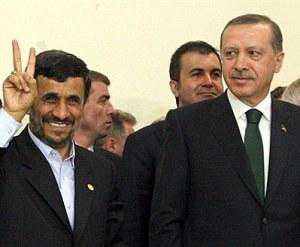Dorian Jones | IstanbuL
21 June 2010

Photo: AFP
Iran’s President Mahmoud Ahmadinejad flashes the V-sign for victory as Turkish Prime Minister Recep Tayyip Erdogan looks on after the Islamic republic inked a nuclear fuel swap deal in Tehran (File Photo – 17 May 2010)
Related Articles
- Turkey Troops, Kurdish Rebels Clash Near Iraq Border
- US Defense Secretary: Europe Pushing Turkey ‘Eastward’
- Israel Moves to Repair Relations With Turkey
This month, Turkey voted against the United Nations Security Council’s fourth round of sanctions against Iran. With Turkey’s Islamic rooted government increasing its economic ties with Iran in the past few years, fears are arising that the pivotal Western ally is in danger of swinging eastward because of resistance in Europe to its bid for membership of the European Union.
Despite growing international tensions over Iran’s nuclear energy program, the Turkish government has forged ahead with energy deals with Iran, expanding its dependency on energy with the nation.
These deals put Turkey in a precarious situation: to enforce or not to enforce the UN sanctions imposed on its neighbor Iran.
Turkey has long been seen as a bridge between East and West. But its belief that sanctions are ineffective and that there are dangers in pushing the Islamic republic into a corner is likely to change its relationship with Western nations.
Earlier this month Turkish foreign minister Ahmet Davutoglu expressed concern over the existing sanctions against Iran.
AP
“Turkey and Iran’s trade volume is around $10 billion,” he says. “And it can rise to $30 billion if sanctions are lifted.”
Iran’s energy resources are seen as important by Ankara to break its dependency on Russian energy.
Iran expert Gokhan Cetinsayar of Sehir University says that in addition to its dependency on gas, there are other trade initiatives with Iran that are economically key to Turkey.
“75,000 trucks going on between Turkey and Iran every year,” said Cetinsayar. “Now there are energy deals. You know how important the Iranian natural gas and all other agreements and initiatives are economically important for Turkey.
With large families usually depending for their livelihoods on cargo trucks, its estimated as many a million Turkish people depend on Iranian trade.
With its increasing economic ties with Iran, there are growing fears that Turkey will balk at enforcing the UN sanctions against Iran.
Turkish foreign minister spokesman Burak Ozugergin says Turkey has already paid a heavy economic price for UN policies with another of its neighbors, Iraq.
“At the beginning of the 90’s, the Turkish volume of trade with Iraq was around the 15 to 20 percent mark of our total volume of trade. The next year, after the imposition of sanctions, this trickled down to almost zero,” said Ozugergin. “Money is not everything. But at least if it did work then we might be able to say to our public, ‘look it was for a good a cause.’ But can we really honestly say that looking back? For Iran again we don’t think it will help to solve the nuclear issue and perhaps may work against it.”
The new sanctions on Iran are expected to cut into the present $10 billion trade volume. It could possibly undermine its energy policy as well. But political scientist Nuray Mert of Istanbul University say some western nations may now not be able to depend on Turkey.
“I was inclined to think that at the end of the day Turkey will join the club when it comes to realization of these sanctions,” she said. “But nowadays I can see the government is planning to avoid these sanctions. Because now we have Turkey signing a lot of economic agreements, against the policy of sanctions.”
For now Turkey has remained circumspect over enforcing new sanctions. One foreign ministry official said “you will have to wait and see.” Analysts say Iran would probably reward any breaking of sanctions with lucrative energy deals. But the political cost could be high because of Turkey’s aspirations for joining the EU. The coming weeks will see Ankara facing a difficult a choice.

Leave a Reply